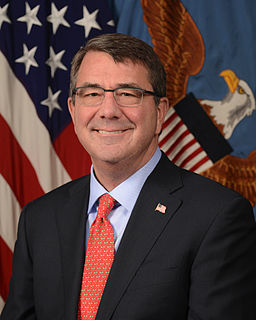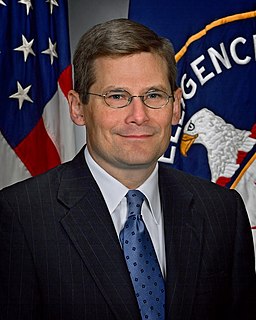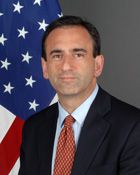A Quote by Ashton Carter
I think it's part of Vladimir Putin's nature to define Russian success in foreign policy as thwarting the United States. That's in his nature. And that is very difficult to align with strategically.
Related Quotes
We have for decades now, and I've dealt with the Russians for 35 years, we have from time to time been able to, even though we have different interests, to align them. That alignment has become more and more difficult under Putin. You see that in Ukraine, you see it in the Middle East. To an extent where he actually defines Russian success as thwarting the United States.
We know that Donald Trump has shown a very troubling willingness to back up [Vladimir] Putin, to support Putin, whether it's saying that NATO wouldn't come to the rescue of allies if they were invaded, talking about removing sanctions from Russian officials after they were imposed by the United States and Europe together, because of Russia's aggressiveness in Crimea and Ukraine, his praise for Putin which is I think quite remarkable.
For the West, the demonization of Vladimir Putin is not a policy; it is an alibi for the absence of one. Putin is a serious strategist – on the premises of Russian history. Understanding US values and psychology are not his strong suits. Nor has understanding Russian history and psychology been a strong point among US policymakers.’
We know that Donald Trump has shown a very troubling willingness to back up Putin, to support Putin, whether it's saying that NATO wouldn't come to the rescue of allies if they were invaded, talking about removing sanctions from Russian officials after they were imposed by the United States and Europe together, because of Russia's aggressiveness in Crimea and Ukraine, his praise for Putin which is I think quite remarkable.
To equate Vladimir Putin and the United States of America, as Donald Trump was asked, you know, I guess it was Bill O'Reilly who said, "But Putin is a killer." And he basically said, "So are we." That moral equivalency is a contradiction of everything the United States has ever stood for in the 20th and 21st century.
Foreign policy always has more force and punch when the nation speaks with one voice. To remain secure, prosperous, and free, the United States must continue to lead. That leadership requires a president and Congress working together to fashion a foreign policy with broad, bipartisan support. A foreign policy of unity is essential if the United States is to promote its values and interests effectively and help to build a safer, freer, and more prosperous world.
I think that it's very important to have the United States' engagement in many situations we have around the world, be it in Syria, be it in the African context. The United States represents an important set of values, human rights, values related to freedom, to democracy. And so the foreign policy engagement of the United States is a very important guarantee that those values can be properly pursued.





























